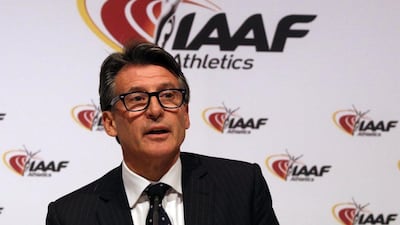The IAAF voted unanimously Friday to extend the ban on the doping-tainted Russian federation, but left the door ajar for some track and field stars to compete at the Rio Olympics as neutrals.
Despite a last-ditch campaign to overthrow the ban led by Russian President Vladimir Putin, the IAAF Council, headed by Sebastian Coe, was unanimous in its decision to uphold the suspension.
But Coe said Russian athletes based outside of the Russian system “could potentially return to international competition as neutrals once their cases are reviewed by our doping review board”.
The International Association of Athletics Federations (IAAF) imposed the ban on Russia in November over state-sponsored doping and mass corruption, and first extended it in March on the grounds that the criteria set for reinclusion had not been met.
But as Russian pole vault star Yelena Isinbayeva reacted immediately by saying she would challenge in court the IAAF decision, an olive branch was oferred.
“If there are individual athletes who can clearly and convincingly show that they are not tainted by the Russian system because they have been outside the country, and subject to other, strong anti-doping systems, including effective drug testing, then there should be a process through which they can apply for permission to compete in international competitions, not for Russia, but as a neutral athlete,” Coe said.
Coe said that the International Olympic Committee (IOC), which meets in Lausanne on June 21, would not have the final say on eligibility of athletes in light of the August 5-21 Rio Olympics.
“The eligibility of athletes to compete internationally sits and lies with the IAAF,” Coe said. “That’s what the IOC would recognise.”
In a damning verdict, the IAAF said that the Russian athletics federation was “at least 18-24 months away from returning to full operational compliance with the World Anti-Doping Code”.
“There are detailed allegations, which are already partly substantiated, that the (Russian) Ministry of Sport, far from supporting the anti-doping effort, has in fact orchestrated systemic doping and the covering up of adverse analytical findings,” the IAAF said.
“In such circumstances, the (IAAF) Taskforce is very clear that the reinstatement conditions have not yet been satisfied, and in particular that Russian athletes cannot yet credibly return to international competition without undermining the confidence of their competitors and the public in the integrity of that competition.”
The result of the IAAF Council vote came as no surprise given the latest damning report from the World Anti-Doping Agency (WADA), released on Wednesday.
Russia’s Sports Minister Vitaly Mutko said the decision had been expected in Moscow and pledged to respond.
“The suspension of the Russian athletics federation is an expected decision, we could have assumed this,” Mutko told TASS news agency. “We will react.”
WADA’s new report said hundreds of attempts to carry out drug tests on Russian athletes this year had been thwarted, with drug testers facing intimidation and threats from armed Russian security forces while athletes continued to evade doping control officers.
The WADA summary, which was compiled with the help of UK Anti-Doping, said more than 736 tests between February 15 and May 29 were declined or cancelled for a variety of reasons ranging from sample collection to athlete whereabouts.
Follow us on Twitter @NatSportUAE
Like us on Facebook at facebook.com/TheNationalSport

